#fellow travelers meta
Text

A MASTERLIST OF ALL THE BOOKS I COULD FIND IN TIM'S BOOKSHELVES
As someone who basically sees Tim Laughlin as my own version of Jesus Christ (I kind of wish I was lying but I have a 'beyond measure' tattoo branding my skin so perhaps I'm entirely serious), I simply needed to know what was on those shelves of his. And this was a hard task to achieve, believe me... but I got much farther than I initially thought I would.
(I've got so much to say about all of these books and how they might string together to create a deeper understanding of Tim as a character but I won't go into it here... maybe in a future post or video essay, who knows).
If you wish to help a girl out and attempt to figure out any of the other books I simply can not crack no matter how I look at the screenshots and mess with the adjustments... here's a folder full of 2k sized screenshots of those shelves.
Before I list the books one by one, I want to make a couple observations:
1) Almost all of the books I was able to pinpoint are non-fiction. The ones that aren't are children's books.
2) Topically, we see an interdisciplinary interest in:
History: from a book on a king in 4BC, to a survey of landholding in England in the 11th century.
Somewhat current historical events: books on World War I and II.
Western Philosophers: specially from the 16th to the 18th century.
Aesthetics: there's at least 2 books on the subject matter, but I couldn't find the second one, sadly.
Spirituality: not only christian/catholic; some of these books touch on Eastern practices such as Buddhism and Hinduism.
Fairy tales / children's books.
Psychology: specially in regards to mysticism and sexuality.
Science and scientific discovery/research.
3) A lot of the history, current events, and spirituality books are autobiographies/memoirs.
4) A lot of books (specially those on sciences and philosophy) tend to be more so anthologies or overviews on a subject matter rather than a book written by one specific author on one very concrete topic.
Overall, this all reflects very well an idea Jonathan Bailey himself expressed in a brilliant interview you can watch here if you haven't yet:
"Tim has buddhist flags in his 1980s flat in San Francisco, he has crystals, he is someone who is always seeking other ways to understand human experience. Which is probably tiring for him. Throughout the decades, he sort of appears as completely different people. At the crux of it there's this extreme grinding, contrasting, aggressive duality between feeling lovable and not feeling lovable. There's such shame in Tim. But it's the push and the pull which keeps him alive.”
This desire to understand human psychology, spirituality, and the ways of the universe through as many diverse lenses as possible, as well as a predilection for non-fiction, expresses very much to me that insatiable thirst for truth that defines his character so strongly.
OKAY, THAT BEING SAID. Here's the list in chronological order of publication.
PS. if you decided to click on any of the following titles it'd definitely not take you to a google drive link of the pdf file where you could download and read these books for yourself. Because that would be illegal and wrong.

Journeys through Bookland by Charles H. Sylvester (1901?) (1922 Edition)
I don't know which specific volume he owns, sorry, I tried my best but the number is not discernible (hell, the title barely is). If anyone wants the download link to these hmu because I'm not about to individually download all 10 right now.
10 volumes of poems, myths, Bible stories, fairy tales, and excerpts from children's novels, as well as a guide to the series. It has been lauded as ‘a new and original plan for reading, applied to the world’s best literature for children.’
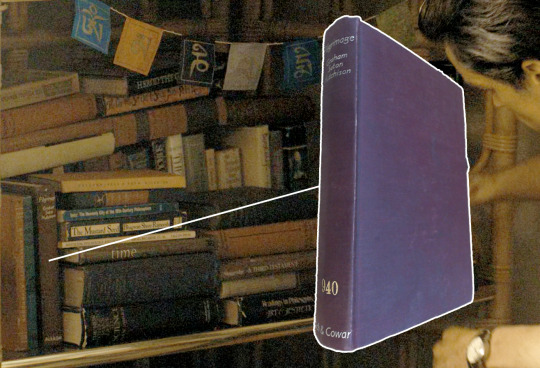
Pilgrimage by Graham Seton Hutchison (1936)
This book provides a view of the battlefields of WW I through the eyes of the average fighting man.
One curious thing about this book is that it's author, a British First World War army officer and military theorist, went on to become a fascist activist later in his life. Straight from Wikipedia:
"Seton Hutchison became a celebrated figure in military circles for his tactical innovations during the First World War but would later become associated with a series of fringe fascist movements which failed to capture much support even by the standards of the far right in Britain in the interbellum period." He made a contribution to First World War fiction with his espionage novel, The W Plan."
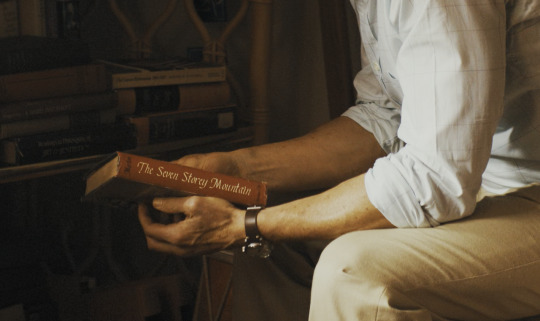
The Seven Storey Mountain by Thomas Merton (1948)
The Seven Storey Mountain tells of the growing restlessness of a brilliant and passionate young man, who at the age of twenty-six, takes vows in one of the most demanding Catholic orders—the Trappist monks. At the Abbey of Gethsemani, "the four walls of my new freedom," Thomas Merton struggles to withdraw from the world, but only after he has fully immersed himself in it. At the abbey, he wrote this extraordinary testament, a unique spiritual autobiography that has been recognized as one of the most influential religious works of our time. Translated into more than twenty languages, it has touched millions of lives.
This book requires no introduction. It's the one he keeps the Fire Island's postcard in and the one we see him re-reading in episode 8 after Hawk brings it to the hospital with him at the end of episode 7.
Just a little detail I noticed:
Apparently he liked the book so much he visited Gethsemani, which was the home of its author all the way up till 1968.

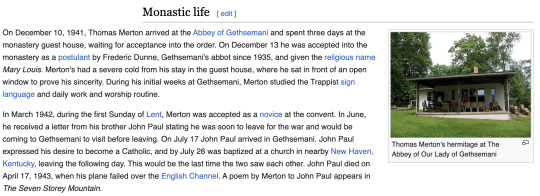
For all we know, he might have even met its author!

Sexual Behavior in the Human Male by Alfred Charles Kinsey, Wardell B. Pomeroy (1948)
When published in 1948 this volume encountered a storm of condemnation and acclaim. It is, however, a milestone on the path toward a scientific approach to the understanding of human sexual behavior. Dr. Alfred C. Kinsey and his fellow researchers sought to accumulate an objective body of facts regarding sex. They employed first hand interviews to gather this data. This volume is based upon histories of approximately 5,300 males which were collected during a fifteen year period. This text describes the methodology, sampling, coding, interviewing, statistical analyses, and then examines factors and sources of sexual outlet.
Yes, Charles Kinsey is indeed behind the Kinsey scale that has done so much for the LGBTQ+ community.

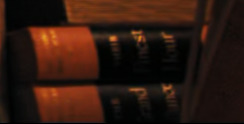
Their Finest Hour (1949), The Grand Alliance (1950), and Closing the Ring (1951) by Winston Churchill
Winston Churchill's six-volume history of the cataclysm that swept the world remains the definitive history of the Second World War. Lucid, dramatic, remarkable both for its breadth and sweep and for its sense of personal involvement, it is universally acknowledged as a magnificent reconstruction and is an enduring, compelling work that led to his being awarded the Nobel Prize for literature in 1953.
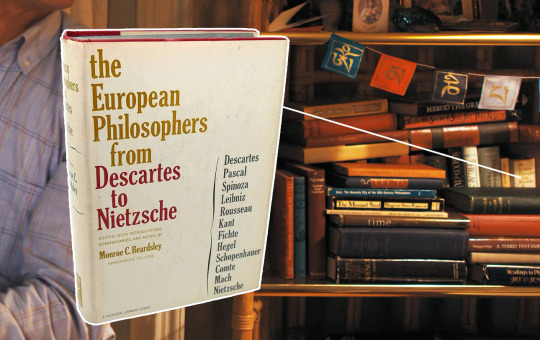
The European Philosophers from Descartes to Nietzsche by Monroe C. Beardsley (1960)
In so far as we reflect upon ourselves and our world, and what we are doing in it, says the editor of this anthology, we are all philosophers. And therefore we are very much concerned with what the twelve men represented in this book--the major philosophers on the Continent of Europe--have to say to us, to help us build our own philosophy, to think things out in our own way. For the issues that we face today are partly determined by the work of thinkers of earlier generations, and no other time is more important to the development of Western thought than is the 250-year period covered by this anthology.
Monroe. C. Beardsley, Professor of Philosophy at Swarthmore College, has chosen major works, or large selections from them, by each man, with supplementary passages to amplify or clarify important points. These include: Descartes - Discourse on Method (Descartes), Thoughts (Pascal), The Nature of Evil (Spinoza), The Relation Between Soul and Body (Leibniz), The Social Construct (Rousseau), Critique of Pure Reason (Kant), The Vocation of Man (Fichte), Introducciton to the Philosophy of History (Hegel), The World as Will and Idea (Schopenhauer), A General View of Positivism (Comte), The Analysis of Sensations and the Relation of the Physical to the Psychical (Mach), Beyond Good and Evil (Nietzsche).
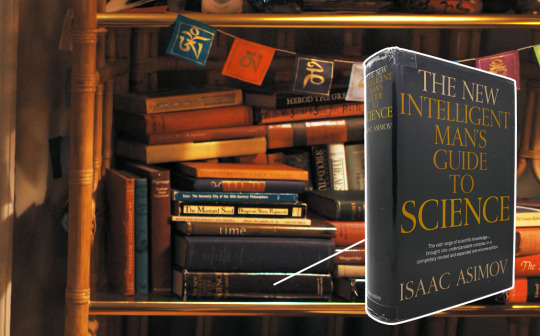
The New Intelligent Man's Guide to Science by Isaac Asimov (1965)
Asimov tells the stories behind the science: the men and women who made the important discoveries and how they did it. Ranging from Galilei, Achimedes, Newton and Einstein, he takes the most complex concepts and explains it in such a way that a first-time reader on the subject feels confident on his/her understanding.
Assists today's readers in keeping abreast of all recent discoveries and advances in physics, the biological sciences, astronomy, computer technology, artificial intelligence, robotics, and other sciences.
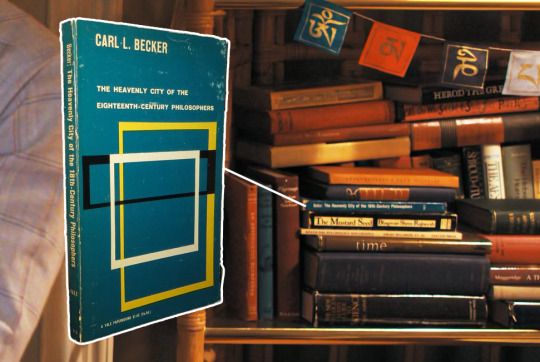
The Heavenly City of the 18th Philosophers by Carl L. Becker (1932) (1962 reprint)
Here a distinguished American historian challenges the belief that the eighteenth century was essentially modern in its temper. In crystalline prose Carl Becker demonstrates that the period commonly described as the Age of Reason was, in fact, very far from that; that Voltaire, Hume, Diderot, and Locke were living in a medieval world, and that these philosophers “demolished the Heavenly City of St. Augustine only to rebuild it with more up-to-date materials.” In a new foreword, Johnson Kent Wright looks at the book’s continuing relevance within the context of current discussion about the Enlightenment.
I find the particular choice of adding this book very curious and on brand, since it explores the idea that philosophers of the Enlightenment very much resembled religious dogma/faith in their structure and purpose. Just... A+ of the props department to not just add any kind of book on philosophy anthology.

Herod The Great by Michael Grant (1971)
The Herod of popular tradition is the tyrannical King of Judaea who ordered the Massacre of the Innocents and died a terrible death in 4 BC as the judgment of God. But this biography paints a much more complex picture of this contemporary of Mark Antony, Cleopatra, and the Emperor Augustus. Herod devoted his life to the task of keeping the Jews prosperous and racially intact. To judge by the two disastrous Jewish rebellions that occurred within a hundred and fifty years of his death -- those the Jews called the First and Second Roman Wars -- he was not, in the long run, completely successful. For forty years Herod walked the most precarious of political tightropes. For he had to be enough of a Jew to retain control of his Jewish subjects, and enough of a pro-Roman to preserve the confidence of Rome, within whose territory his kingdom fell. For more than a quarter of a century he was one of the chief bulwarks of Augustus' empire in the east. He made Judaea a large and prosperous country. He founded cities and built public works on a scale never seen before: of these, recently excavated Masada is a spectacular example. And he did all this in spite of a continuous undercurrent of protest and underground resistance. The numerous illustrations presents portraits and coins, buildings and articles of everyday use, landscapes and fortresses, and subsequent generations' interpretations of the more famous events, actual and mythical, of Herod's career.
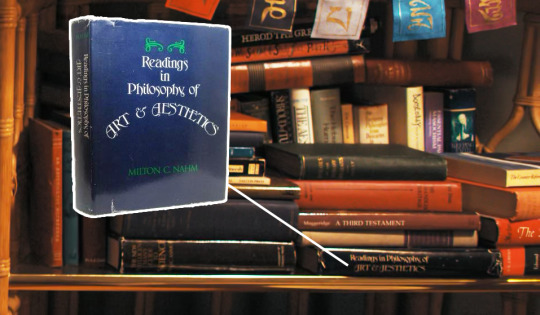
Readings in the Philosophy of Art and Aesthetics compiled by Milton Charles Nahm (1975)
A college level comprehensive anthology of essays written on the arts and the field of aesthetic philosophy.

The Mustard Seed: Discourses on the Sayings of Jesus Taken from the Gospel According to Thomas by Bhagwan Shree Rajneesh (1975)
This timely book explores the wisdom of the Gnostic Jesus, who challenges our preconceptions about the world and ourselves. Based on the Gospel of Thomas, the book recounts the missing years in Jesus’ life and his time in Egypt and India, learning from Egyptian secret societies, then Buddhist schools, then Hindu Vedanta. Each of Jesus' original sayings is the "seed" for a chapter of the book; each examines one aspect of life — birth, death, love, fear, anger, and more — counterpointed by Osho’s penetrating comments and responses to questions from his audience.
(You don't know how fulfilling it was to find some of these books and just sit there like "oh my god, yessss, he'd SO read that".)
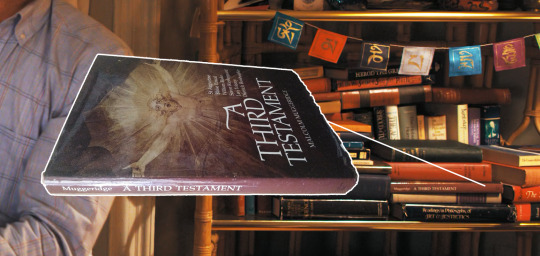
A Third Testament by Malcolm Muggeridge (1976)
A modern pilgrim explores the spiritual wanderings of Augustine, Pascal, Blake, Kierkegaard, Dostoevsky, Tolstoy, and Bonhoeffer. A Third Testament brings to life seven men whose names are familiar enough, but whose iconoclastic spiritual wanderings make for unforgettable reading. Muggeridge's concise biographies are an accessible and manageable introduction to these spiritual giants who carried on the testament to the reality of God begun in the Old and New Testaments.
- St. Augustine, a headstrong young hedonist and speechwriter who turned his back on money and prestige in order to serve Christ
- Blaise Pascal, a brilliant mathematician who pursued scientific knowledge but warned people against thinking they could live without God
- William Blake, a magnificent artist-poet who pled passionately for the life of the spirit and warned of the blight that materialism would usher in
- Soren Kierkegaard, a renegade philosopher who spent most of his life at odds with the church, and insisted that every person must find his own way to God
- Fyodor Dostoevsky, a debt-ridden writer and sometime prisoner who found, in the midst of squalor and political turmoil, the still small voice of God
- Leo Tolstoy, a grand old novelist who swung between idealism and depression, loneliness and fame and a duel awareness of his sinfulness and God s grace
- Dietrich Bonhoeffer, a pastor whose writings and agonized involvement in a plot to kill Hitler cost him his life, but continue to inspire millions
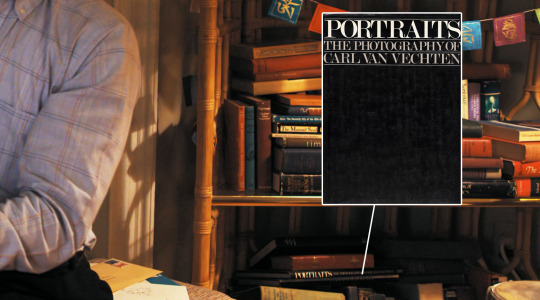
Portraits: The photography of Carl Van Vechten (1978)
Can't find a file but you can borrow it from archive.com in the link provided.
During his career as a photographer, Carl Van Vechten’s subjects, many of whom were his friends and social acquaintances, included dancers, actors, writers, artists, activists, singers, costumiers, photographers, social critics, educators, journalists, and aesthetes. [...] As a promoter of literary talent and a critic of dance, theater, and opera, Carl Van Vechten was as interested in the cultural margin as he was in the day’s most acclaimed and successful people. His diverse subjects give a sense of both Carl Van Vechten’s interests and his considerable role in defining the cultural landscape of the twentieth century; among his many sitters one finds the leading lights of the Harlem Renaissance, the premier actors and writers of the American stage, the world’s greatest opera stars and ballerinas, the most important and influential writers of the day, among many others.
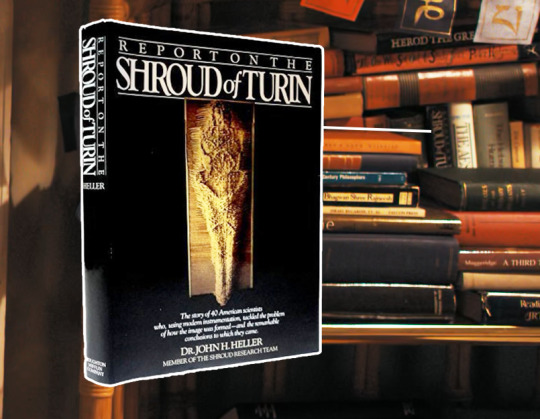
Report of the Shroud of Turin by John H Heller (1983)
Heller, while a man of science, was nevertheless a devout man (Southern Baptist). He viewed his task concerning The Shroud with great scepticism; there have been far too many hoaxes in the world of religion. The book describes in great detail the events leading up to the team's conviction that the Shroud was genuine; last - not least - being Heller and Adler's verification of "heme" (blood) and the inexplicable "burned image" of the crucified man. Although carbon dating indicates that the image is not 2000 years old and that the cloth is from the Middle Ages, there is not enough evidence to disprove Heller's assertion that the Shroud is indeed genuine.
Context for those who may not know (though I doubt it's necessary): The shroud of Turin "is a length of linen cloth that bears a faint image of the front and back of a man. It has been venerated for centuries, especially by members of the Catholic Church, as the actual burial shroud used to wrap the body of Jesus of Nazareth after his crucifixion, and upon which Jesus's bodily image is miraculously imprinted."
It is a very controversial subject matter and I definitely don't know that from going to an Opus Dei school since the day I was born till the day I graduated high school.

Mysticism, Psychology and Oedipus by Israel Regardie (1985)
I've tried my hardest but despite many Israel Regardie books being on the world wide web, I can't find a copy of this specific one.
Mysticism, Psychology and Oedipus, from the Small Gems series is one of these mysterious alchemys which Regardie and Spiegelman crafted for the serious student of mysticism. Mysticism, Psychology and Oedipus by Dr. Israel Regardie and his friend, world renowned Jungian Psychologist, J. Marvin Spiegelman, Ph.D. was created to reach the serious student at the intersecting paths of magic, mysticism and psychology. While each area of study overlaps they also maintain their own individual paths of truth. One of Regardie’s greatest gifts was his rare ability to combine these difficult and diverse subjects and make them understandable.
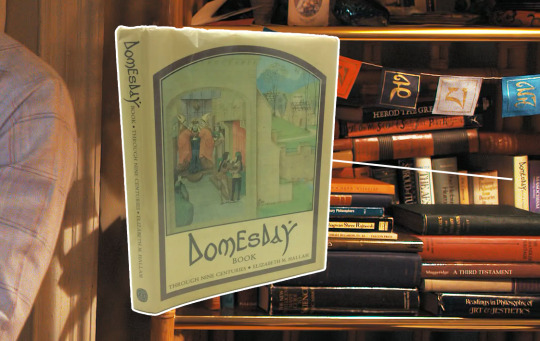
Domesday Book Through Nine Centuries by Elizabeth M. Hallam (1986)
In 1086 a great survey of landholding in England was carried out on the orders of William the Conqueror, and its results were recorded in the two volumes, which, within less than a century, were to acquire the name of Domesday, or the Book of Judgment 'because its decisions, like those of the last Judgment, are unalterable'. This detailed survey of the kingdom, unprecedented at that time in its scope, gives us an extraordinarily vivid impression of the life of the eleventh century.
The following two are a fuck up on the props department part because they were published after 1987 but we'll forgive them because they were not expecting for me to do all this to figure out the titles of these books, I'm sure:
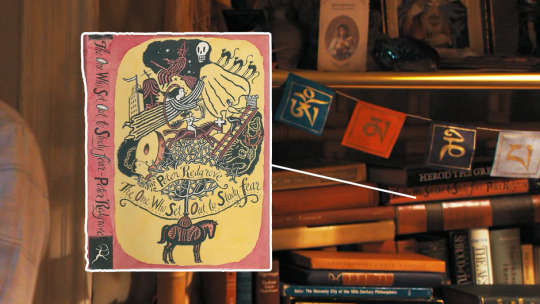
The One Who Set Out to Study Fear by Peter Redgrove (1989)
This book barely exists physically, rest assured it does not exist online... LOL.
The author of The Wise Wound presents here a re-telling of Grimm's famous fairy tales, written in a manner and spirit more suited to the present day. Each story is rooted in the original, but cast in an energetic style that is both disrespectful and humorous.
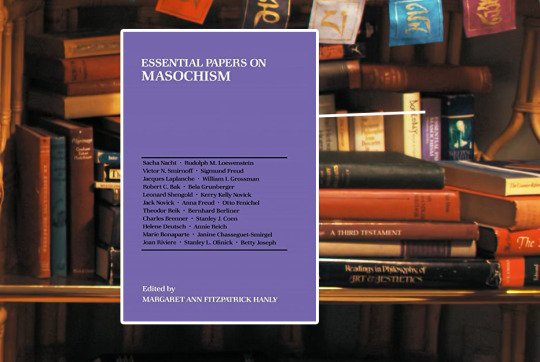
Essential Papers on Masochism by Margaret Ann Fitzpatrick Hanly (1995)
The contested psychoanalytic concept of masochism has served to open up pathways into less-explored regions of the human mind and behavior. Here, rituals of pain and sexual abusiveness prevail, and sometimes gruesome details of unconscious fantasies are constructed out of psychological pain, desperate need, and sexually excited, self- destructive violence.
In this significant addition to the "Essential Papers in Psychoanalysis" series, Margaret Ann Fitzpatrick Hanly presents an anthology of the most outstanding writings in the psychoanalytic study of masochism. In bringing these essays together, Dr. Fitzpatrick Hanly expertly combines classic and contemporary theories by the most respected scholars in the field to create a varied and integrated volume.
This collection features papers by S. Nacht, R. Loewenstein, Victor Smirnoff, Sigmund Freud, Jacques Laplanche, Robert Bak, Leonard Shengold, K. Novick, J. Novick, S. Coen, Margaret Brenman, Esther Menaker, S. Lorand, M. Balint, Bernhard Berliner, Charles Brenner, Helene Deutsch, Annie Reich, Marie Bonaparte, Jessica Benjamin, S.L. Olinick, Arnold Modell, Betty Joseph, and Janine Chasseguet-Smirgel.
Let's not forget another book we know has been present in his shelves at some point:

Look Homeward, Angel by Thomas Wolfe (1929)
It is Wolfe's first novel, and is considered a highly autobiographical American coming-of-age story. The character of Eugene Gant is generally believed to be a depiction of Wolfe himself. The novel briefly recounts Eugene's father's early life, but primarily covers the span of time from Eugene's birth in 1900 to his definitive departure from home at the age of 19. The setting is a fictionalization of his home town of Asheville, North Carolina, called Altamont in the novel.
And Ron Nyswaner mentioned in a podcast (might be this one? I'm not sure) that he scrapped from the script a line where Tim recommends this poem at some point:
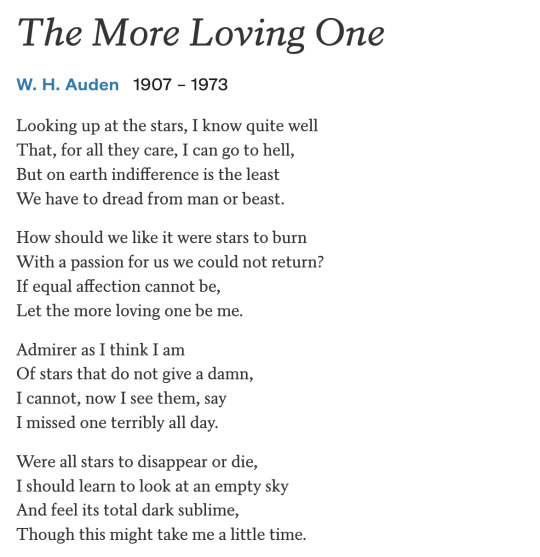
He specially emphasized the line "If equal affection cannot be, Let the more loving one be me".
And lastly, if anyone wanted to know:
His copy of the bible is the Revised Standard Version by Thomas Nelson from either 1952 or 1953.
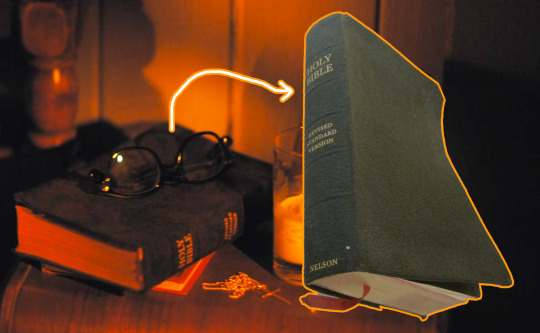
Because why the hell not figure out what specific translation of the holy bible a fictional character was basing his beliefs on — as if the set designers cared nearly as much as I do.
#fellow travelers#fellow travelers meta#tim laughlin#fellowtravelersedit#i know it doesnt precisely fit the tag but hey.. theres a gif right there#this is such a jobless thread... but i AM jobless
126 notes
·
View notes
Text
something that @timothydavidlaughlin posted about the last shot that we see of tim in the show is of him being heartbroken and lost, devoid of all hope and it got me thinking…




it’s still such a perfect end bc it’s in a way cyclical - the story had ended for us but for tim it had just begun. that last look of heartbreak gives away to who we know tim became, the tim we had loved since ep 1 when we saw him in the 80s
like this tim in that moment at the hospital had so much ahead of him, 30 years worth of pain but also love, struggle but also acceptance.
he didn’t know it, but we did - perhaps the first time in the show where we knew exactly the journey he was about to embark on.
he started his journey in this moment with tears but he ended it with a smile on his face
the tim we see at the hospital was one that marked the end of an era, of a lifetime only for another one to start - where hope died, a new life began and this moment with jackson was such a perfect way of showing that.
it’s all a cycle and i love how well it was written.
156 notes
·
View notes
Note
Why do you think hawk let tim bottom him when he was so adamant no one ever would? I’ve been so curious since watching it, he was so in control but around tim he crumbled 🥹
I love that you said "he's so in control" because that's really key to Hawk's character and how he expresses his sexuality.
I think Hawk being so determined about only topping wasn't just about the physical or pleasure element. It's not only that he wanted to be in control of the physical aspects. He's definitely naturally dominant and really enjoys being a dom top. But it's not like he couldn't ever enjoy bottoming — he certainly did with Tim.
But that would mean some physical "vulnerability", and physical vulnerability probably wasn't any different from emotional vulnerability in Hawk's mind. And in order to protect his job, his reputation, and his family, he could not risk any emotional vulnerability at all with the strangers he usually fucked. So in addition to total emotional control (not letting anyone in, not even telling them his name), he also kept total physical control at all times. That was the only way he felt somewhat safe. I think he wouldn't have enjoyed bottoming with any other guy, because of his personality and the strict protections he built up over time, he would've felt too vulnerable and exposed to have any fun.
Tim is the one exception to all of this.
Hawk let Tim do it because he trusted him. Tim was the only person who knew Hawk long enough and well enough. And he did fall in love with Tim during the 50s. There are so many scenes where Hawk's looking at Tim with such deep, deep emotion in his eyes. It's clear that he loved him. So if it would happen with anyone, it would be Tim.
And it happens within a very specific context. They have just reconnected after years apart. Tim went to the army to get away from Hawk, but it didn't change how they feel when they're together. They think they're going to work at the state department together again, and it will be just like the old days—only better, now that the M Unit can't hurt them. When Tim fucked him, Hawk could feel close to him in a whole new way. He didn't have to manage and worry and keep control anymore.
Hawk offered because he wanted to show Tim that he was special to him. That he loved him. That he missed him. That he wanted him to stay. That this time, maybe things could be different. That he could finally be vulnerable with Tim, more than ever before.
But most of all that he loved him.
#fellow travelers#fellow travelers meta#ft spoilers#hawk x tim#ask#anonymous#text#hope this makes sense 😵💫#im not sorry about how long this is. i want people to KNOW
45 notes
·
View notes
Text
Fellow Travelers sex scenes
I can't stop thinking about what Matt and Jonny keep repeating over and over again in interviews, regarding the FT sex scenes. That, in the writing and filming it was important that:
No two scenes were the same.
Every sex scene informed the story.
The characters were not the same before the scene as they were after. That they were changed by it.
So, let's talk about them.
"Pretend"
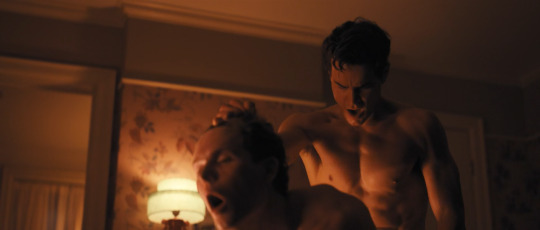
establishment of hawk's usual modus operandi -- brief fucks with strangers. he keeps a tight rein on his desires and won't allow himself to want more.
2. "Fold them."
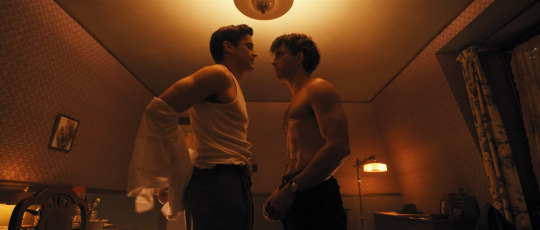
establishing dynamics, hawk is in control, tim is being (happily) led. par for the course for hawk (or is it?)
3. "I'm your boy, right?"
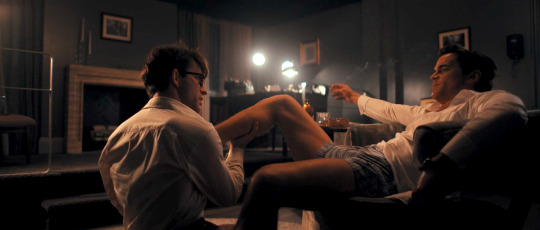
tim can play, too. this dynamic is not one-way. the 'power' in this relationship definitely does not lie solely with hawk. you might even say this flips the power dynamic on its head. hawk is GONE.
4. "Do you like it this way? Your life, like this?"

not a sex scene, but one of the first slow, tender aftermaths. clear now that, for both of them, this goes much much deeper than just sex.
5. "I belong to Hawkins Fuller."

tim showing that he's willing to meet hawk on his level. the submission and dominance are so intertwined here they can't be separated. it's the willingness of that submission, the willingness of that Belonging, that changes everything.
and tim begging (through provocation) hawk to acknowledge him / what they have, out loud. "who do you belong to" = "i love you, i need you, tell me you need me too."
6. "It's your turn tonight."
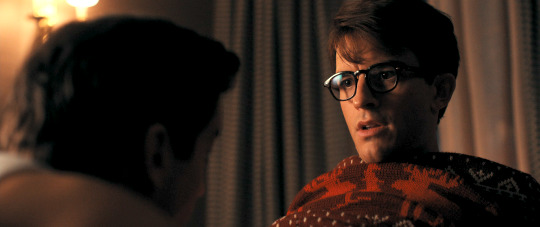
a fucked-up goodbye, on hawk's part. he really thinks this might be the last time he's allowed to see tim, and he says 'i love you' the only way he knows how -- with his body, with service.
7. "Your Honor, I stand before you accused of being sweet."
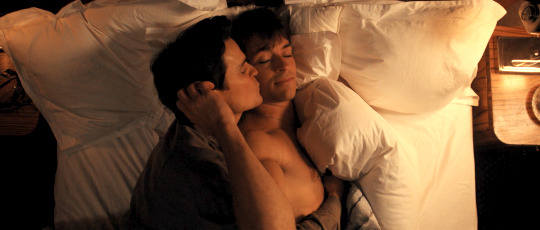
crucially, not a sex scene. even more crucially, there is no sex at all in episode 5, where they separate for the first (and, they think, last) time. instead, we're shown what they're really giving up -- this too sweet (painfully sweet) domesticity.
8. "We don't have to do what we used to do."
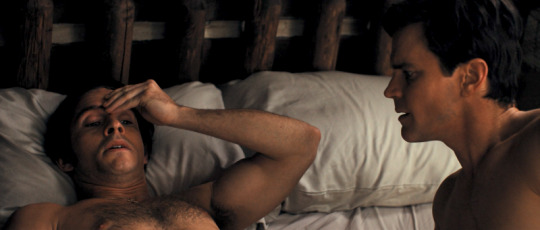
the horribly empty aftermath. where they give in to "sex", of a sort, but it's dry and horrifically painful and NOT AT ALL what either of them want. because what they want is intimacy, not sex. and they're not allowed this.
9. "Stay with me."
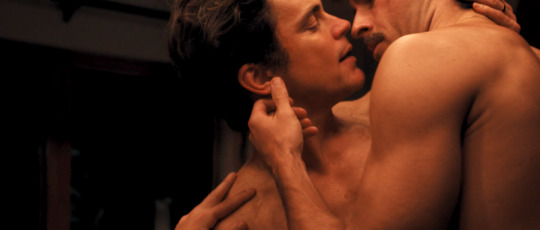
the botched threesome, where craig is an afterthought, an excuse for hawk and tim to be together, and even then, horrifically painful in the way they LONG for each other and for what they can't have.
10. "I want you to fuck me."
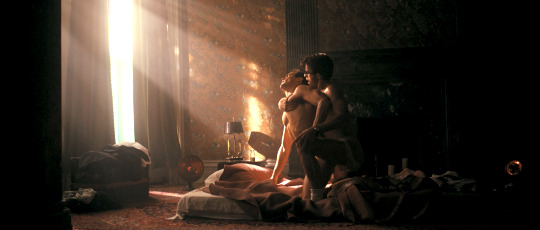
a true surrender. again, hawk showing what he wants the only way he knows how -- through his body -- giving tim his willing submission, body, heart and soul.
11. "We'll be colleagues. We'll see each other every day."

not technically a sex scene, but the truest expression of them 'making love' that we ever get on screen. returning to #1, it's the polar opposite of what hawk had previously allowed himself, and it's what he really wants -- all the intimacy he'll shortly be sacrificing.
12. "That better?" "Oh yeah."

finally, finally, after all those years, a return to the true intimacy they were craving.
#can i just add how much i ADORE that they left 1957 for the end?#it's the clearest view we have of their missed potential -- of everything they COULD have had 😭#fellow travelers#fellowtravelersedit#ft meta#*
1K notes
·
View notes
Text
Still trying to collect my thoughts after the finale, but one of the many things I love about the final conversation between Hawk and Tim is how clearly Tim has moved on – not by forgetting about Hawk or because he didn’t love him anymore, but by accepting that his own love for Hawk was enough. He didn’t expect more, he didn’t need more.
Hawk, on the other hand, has constantly been running away from his love for Tim, unable to admit how important Tim essentially was for him. I found it almost funny how he asked “Don’t you need me?” back in episode 7, because it is very clear at that point that Hawk needs him much more than Tim needs Hawk. But the problem is that Hawk never wanted to need Tim; never wanted to be in love with him. Tim has been honest within his feelings for Hawk, which has allowed him to find peace. Hawk has never been able to do that.
It was clear from the beginning that Tim needed someone like Hawk in his life – someone that represented love and passion to him. He also found that love and passion in Church and within his idolization of McCarthy. But Hawk allowed him to be authentically himself – something that neither his faith nor his political beliefs, and not even his family, could give him.
Besides being fond of him, I believe that Hawk very much admired Tim from the very beginning. He admired Tim’s care and passion, because those are the exact things Hawk was missing and needed in his life. The last scene of the first episode already shows that Hawk needs Tim – needs his comfort and compassion.
Essentially, Hawk is the only person in Tim’s life that Tim feels like he can truly be himself with. And Tim is the only person in Hawk’s life that Hawk can allow himself to be vulnerable with.
Hawk is fine with the way their relationship continues because it is always on his terms. Tim is there for him and he doesn’t need more. But Tim clearly struggles within it, because he does need more than Hawk can give him. He doesn’t just want to eat dinner in a restaurant, pretending Hawk is his uncle, but he wants to eat dinner in a restaurant while letting everyone know that this is the man he loves.
Then Hawk decided to end their relationship at the worst time possible: the one time that Tim truly needed Hawk. At this point, they are both aware that Tim has to let go of Hawk, yet neither can admit that Hawk has to let go as well. As a result, Hawk wants to reunite with him in ’57, and Tim relents, but with different expectations – ready to have the casual affair Hawk always wanted. I think the scene of them dancing together naked is a quite pivotal scene on why this didn’t work. For one, Tim is clearly unable to just be casual about anything. But it also shows that Hawk very clearly can’t have anything casual with Tim anymore either.
Tim then continues his search for something more – searching for what he found with Hawk but knew very well Hawk could not give him. First, he’s returning to his faith, trying to become a priest. Then he becomes a social worker. And, throughout all this, he’s still passionate about his political beliefs – and while those beliefs have changed over the years, the root to it all is still his compassion and care. He also moves to San Francisco, choosing to be authentically himself by coming out, and living within a queer community. He doesn’t need Hawk anymore. He still loves him, but he doesn’t need him.
Hawk, however, has never tried to look for the comfort Tim has given him elsewhere. He pushed Tim out of his life when he believed that he had to, then tried to reconcile when it was convenient for him. Because, in the end, even his family could not give him the same love and care, as he constantly felt like he had lie to them. And don’t get me wrong, Hawk clearly loved his family, but he never found the same comfort with them as he had with Tim, because with Tim he could be vulnerable in a way that he has never allowed himself to be with Lucy or their children.
However, after Tim leaves him in ’79, I do believe that he is trying his best to let Tim go. He’s become much more caring when we meet him in ’86, possibly allowing himself to find comfort and happiness in the life he has built with his family.
At this point, Tim has found peace within his feelings for Hawk. He doesn’t need him anymore, but neither does he regret anything. He still loves him, but that love is enough for him. He’s not searching for more, because he’s already found it.
And this is perhaps the first time that Hawk is truly there for Tim – deciding to stay with him, standing by his side, showing his love for him publicly and eventually admitting it to his daughter. And while I believe that Hawk has been more or less aware of his feelings for Tim since the 50s, I also believe that he only truly admitted it to himself after everything was over. His confession to his daughter was also a confession to himself.
#fellow travelers#ft spoilers#not sure how much sense i make i'm still recovering from the finale#i have so many thoughts about this damn show i could probably write a million essays#hawkins fuller#tim laughlin#hawk x tim#meta
93 notes
·
View notes
Text
I wonder if Hawk will stay with Tim 'til the end.
I only want to see one version. But I can see both.
I can see him stay. The reality of Tim's condition – the fact that he's truly and irrevocably dying – has finally hit him and started to sink in. The realization that this is it, that they have barely any time left, that soon he will have to keep on living a life in which Tim is no more – the ever-present knowledge that he's out there and, thus, the possibility of their paths crossing again gone – devastates him and fills him with terror. He has no time to even consider the enormity of his regrets, let alone grasp how to ask for forgiveness or offer something either of them deems even remotely adequate. The only thing that would demonstrate the truth of his feelings for Tim and might be able to provide him with a modicum of peace is for him to stay – for him to, for once in his life, meet his emotions head on. Not hiding, not denying, not explaining any of it but letting it all in – both the joy of a few more shared moments and the shattering pain of losing Tim. For good this time.
And this is exactly why I see him leave, too. For someone who's spent his entire life being scared of his emotions and suppressing them by any means necessary, there is nothing more terrifying than letting that control go – than letting himself feel. And there's nowhere to hide from the feelings Tim's state evokes in him when he's staring it in the face. He can't rationalize them. He can't put them off and hope that by the time they meet next they will be more bearable. He can only run now – while there's still an opportunity, however flimsy, to tell himself that it's not too late. That they still have time. That going back to his everyday life, he will still have what he's always had – the knowledge that there's Tim. There's Tim. Because he didn't witness the opposite with his own eyes. This is the only way for him to keep up the coping mechanisms he's been using his entire life to survive – compartmentalization and denial. This is, he might feel, the only way to keep on surviving once Tim is gone.
#I HATE analyzing characters without knowing everything there is to know about them#meaning I hate analyzing characters before the entire series is out#but I can't help it#they're killing me#anyway#hawkins fuller#hawk fuller#tim laughlin#hawk x tim#fellow travelers#fellow travelers spoilers#meta
51 notes
·
View notes
Text
Tim's home in San Francisco
Based on his address, seen here:
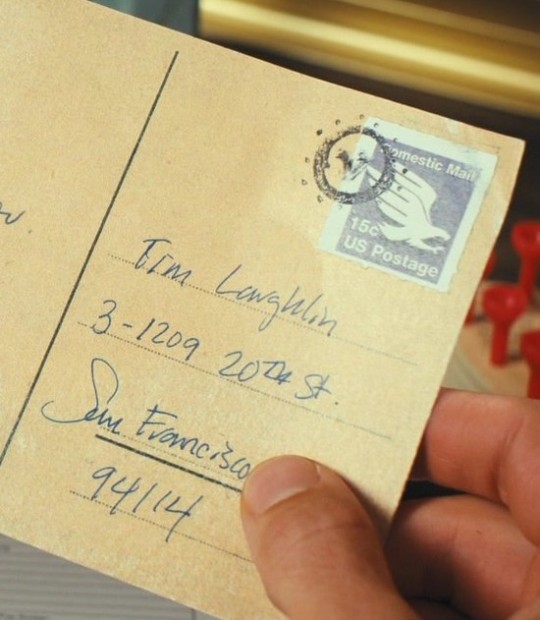
Neighborhood:
20th Street is located in the Potrero Hill neighborhood of San Francisco. It is "serenely nestled in the middle of the Mission District". It is on the eastern side of San Francisco.
During the 1960s, Potrero Hill became a hub for many artists and members of the LGBT community. It was desirable for its location and affordable rent at the time. It was a thirteen minute bike ride from 20th Street to Castro-Mission Health Center.
Also, just some fun information: 20th Street is also a six minute car ride to San Francisco General Hospital. By foot, it's eighteen minutes. By bike, it's five minutes. I'll bet Jerome let Hawk borrow a bike so he could get there as fast as possible.
Congressional Districts:
From February 18, 1964 to January 3, 1975, his congressional district was the 5th district.
Then, due to redistricting in 1975, from January 3, 1975 to January 3, 1993, his congressional district was the 6th district.
During the 60s, 70s, and early 80s, his congressmen were brothers Phillip and John Burton. From 1983 and onward, his congresswoman was Barbara Boxer. All three of them were democrats.
State Senatorial Districts:
From January 2, 1967 to November 30, 1976, his senatorial district was the 9th district.
Due to redistricting in 1976, from December 6, 1976 to November 30, 1984, his senatorial district was the 5th district.
Due to redistricting again in 1984, from December 3, 1984 to November 30, 1996, his senatorial district was the 3rd district. His state senator was Milton Marks, who served as both a republican and democrat.
#tim laughlin#fellow travelers#meta#text#tim and san francisco#this is mainly for me lmao#but just in case anyone else wants to know#what if he went to cal to get his ba in social work just because i said so#he probably went to sfsu though#still love that for him#okay i need to apply for jobs lol#reference
29 notes
·
View notes
Text
Romantic expectations and the story we didn't see: A magic trick hiding in plain sight
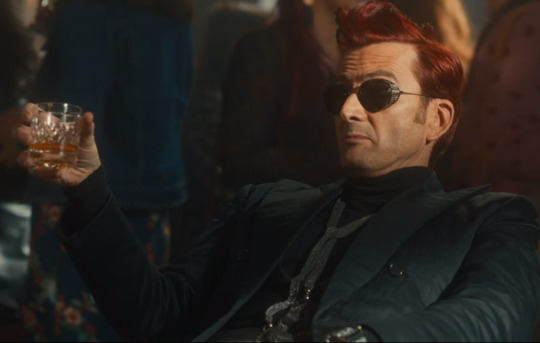
Here's a hopeful meta for all my fellow celestial brainrot sufferers out there. Cheers! :)
This idea started as a dead end, trying to track the movements of Crowley’s sideburns/tattoo because I thought time travel shenanigans were afoot. I had to abandon that theory when it was pointed out that David was simultaneously filming as the sideburns-having Fourteenth Doctor, and in-universe Crowley can do whatever he wants with his facial hair whenever he feels like it. But hey - null findings are still findings!
On the bright side, pausing the show to make notations in a spreadsheet forced me to slow down and notice other changes I'd overlooked the first time around: acting choices, costuming choices, references to book lore. And possibly a few surreptitious flicks of the wrist, in places where we’re meant to be focused on the magician’s other hand.
@amuseoffyre and @ineffablefood had a great exchange recently about romance and “the significance of misdirection and three-in-one (magic) tricks” throughout the show. I suspect Neil has done something brilliant with the audience’s long-standing expectations (since the 1990s, really) for the love story between Crowley and Aziraphale to develop. And while it is a wonderful story indeed, playing to this expectation lets Neil distract his audience from the blink-and-you'll-miss-them seeds he's planting for the final chapter.
Continued below the cut...
Let’s start at the beginning of Episode 2. First, context: In the previous installment, Crowley stormed out of the bookshop, was whisked away to Hell by Beelzebub where he learns about the Book of Life threat to Aziraphale’s existence, then returned to the bookshop to dance a little apology dance and hide Gabriel with an unintentionally massive joint miracle. In S2E2, we and Shax catch up with Crowley as he's snoozing in the Bentley.
Shax: “You’re in trouble”
A. J. Crowley, cool as a cucumber: “Obviously. Former demon, hated by Heaven, loathed by Hell. How will our hero cope?”
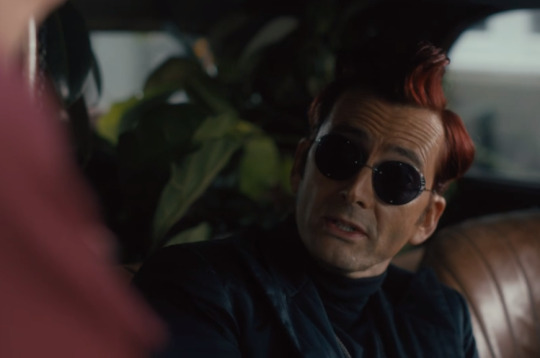
Interesting! Sarcastic? Yes, absolutely; but that’s also a good 4500 years and an averted apocalypse away from “I’m a demon. I lie,” wouldn’t you say? Someone is sounding a whole lot less depressed and aimless and navel-gazey (do snakes have navels?), and a whole lot more like he’s got a project to focus on, since his "what's the point?" ruminations on the park bench in E1.
And of course we all noticed the costume change right away. Hello, black turtleneck. Feeling cute today, thought I’d cover up my graceful long neck? That sounds unlikely. Let’s put a pin in this one.
There’s also an interesting acting choice going on here. Crowley speaks to Shax in a funny, drawling, too-cool-for-you voice that we haven’t heard in a while. Specifically, not since 1967. If you go back and give the S1E3 scene in the Dirty Donkey a listen, you’ll hear it (and if you know of another instance of it that I've missed, please let me know!). In S2E2, he keeps up this odd voice (if anybody knows what kind of affect this is supposed to be, please do tell!) throughout this dialogue with Shax, except for the brief moment when she first surprises him about the joint miracle having been detected.
1967 was a fun year. Crowley masterminded a heist! And seemed like he was having a ball doing it, right up until his little caper was called off after Aziraphale brought him the thermos of holy water. Crowley spoke to his co-conspirators in that same funny, very 60’s-caper-film voice. He wore a hip 60’s turtleneck. He bought petrol for the only time ever, so he could get those sweet James Bond bullet hole decals for his car (per the book, seen on the Bentley in the show).
Those James Bond bullet hole decals would of course have been part of a promotion for this 1967 release, which you just know our film-enjoying demon went to see in the theater:
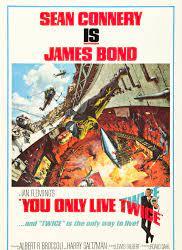
Starring this suave, be-turtlenecked guy:
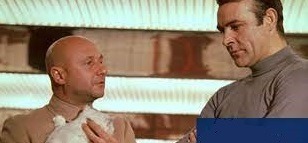
And now - begging your forgiveness - a brief rant.
There are a number of posts out there that refer to Crowley’s S2E2 turtleneck as a flirtatious sartorial choice - actually, ‘slutty’ seems to be the favored accusation. There are even a few posts floating around commenting on how sweet it is that Crowley swaps out his slutty, kinky, throw-me-over-your-desk-and-take-me turtleneck for a more dressy and appropriate collared shirt specifically to attend Aziraphale’s Jane Austen ball.
Now this is all in good fun, and Crowley does indeed look fantastic here, and I do love a good fangirling sesh as much as the next person. However, fandom’s collective tendency to interpret what we are seeing on the screen through the lens of romantic expectation can, at times, give rise to a kind of blinkered enthusiasm that obscures the original text in a haze that is part Mandela Effect, part unrestrained horniness, and part in-group code talking and identity reinforcement.
Respectfully, Crowley’s black turtleneck does not appear at all in S2E5: The Ball. In fact, it never appears again after the end of S2E2.
For Someone’s sake, let’s collectively pull our heads out of the romantic fog/gutter for a moment and focus on what we are actually seeing in the book and on the screen. For Crowley, this is an uncharacteristic within-period costume change. There is a surreptitious flick of the wrist happening here, out in broad daylight, and we are all missing it.
So here’s a thing. Aziraphale appears to have settled comfortably into life on Earth, his neighborhood, his books, using Crowley as an outlet for sharing his good deeds that he would once have reported to Heaven. Meanwhile, at first glance, Crowley appears stuck in a rut. There he slouches on a park bench with Shax in S2E1: a guy who lives in his car, stagnantly clinging to old familiar habits, mulling over the pointlessness of it all.
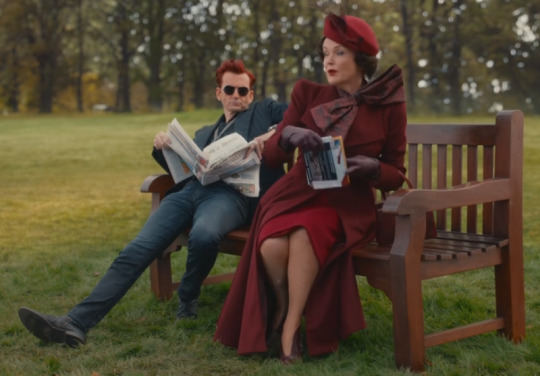
Setting aside the bit about living in the Bentley (I’m going to attribute this to well-documented issues between him and Aziraphale, discussed in many other excellent metas, and move on), Crowley has at least two very good, proactive reasons for maintaining his contact with Hell through Shax. First and foremost, it’s a source of information he can use to keep ahead of potential threats to Aziraphale and himself.
But also, I would posit…he kinda likes it.
Recall that book GO was first conceived as a parody, with Aziraphale and Crowley as spy-against-spy (but not really) field operatives in an ages-old cold war between Heaven and Hell. Their entire book dynamic is rooted in the trope of two opposing agents who have been in the field for so long that they now have more in common with each other than with their respective head offices. Their St. James’s Park meetings among other spies and ministers trading secrets are a sendup of what was once a well-known Cold War-era cliché.
Our contemporary Crowley still likes slick outfits and hellaciously expensive watches and high-performing vintage cars and pens that write underwater while looking like they could break the speed limit. He coaches Shax on how to blend in as a demon on Earth, and he helpfully redirects the wayward contact looking for the Azerbaijani sector chief. He loves improvising and getting away with shenanigans under the institutional radar. And boy golly was he impressed with Jane Austen: master spy, brandy smuggler, and mastermind of the 1810 Clerkenwell Diamond Robbery.
And if you look at it a certain way, for as long as Crowley has considered himself to be on “[his] own side” - going at least as far back as Job - he could almost think of himself as a sort of double agent. It’s actually a very romantic sort of notion, befitting our hopeless romantic of a (professedly former) demon; but it’s romantic in a very different way than we, the audience, have been primed to watch for.
In other words, in a very “on my own side” kind of way, Crowley really gets a kick out of being a spy. Or at least, dressing up and accessorizing as one, and moonlighting as a good-doing double agent when he can get away with it. And also being a plotting criminal mastermind. Two sides of a coin, really. Just look at Jane Austen.
My point is: No, Crowley did not wait around for Shax to come find him in a turtleneck so that he could go flirt with Aziraphale later. He’ll flirt with Aziraphale no matter what. No, this:
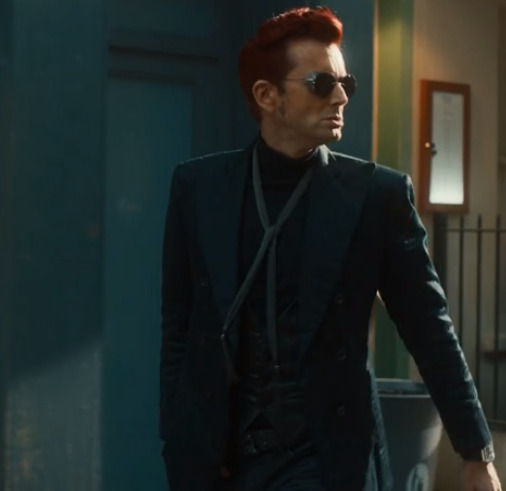
is actually this:
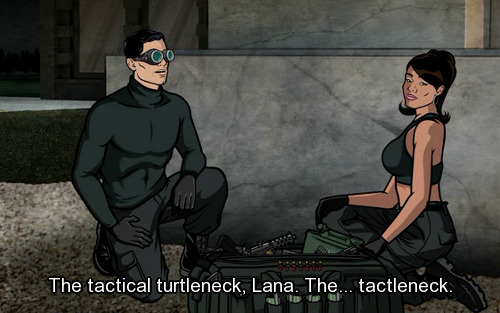
Much like the one he wears to the Dirty Donkey in 1967:
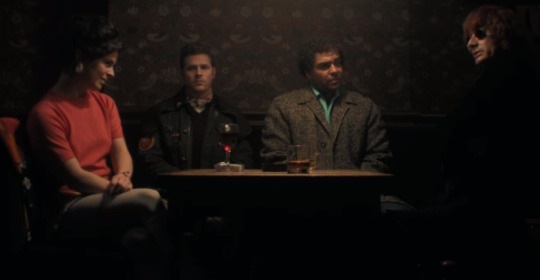
whilst holy water heist-plotting. Here's a clearer shot with gratuitous Bentley, because I love them:
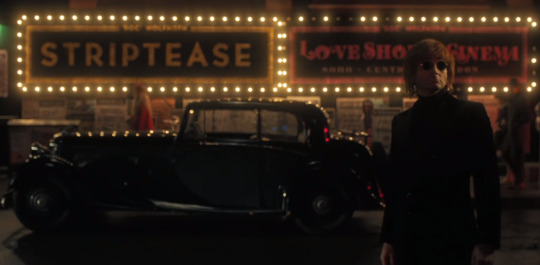
…and which he'll wear again, with appropriate camouflage, while infiltrating Heaven in S2E6:
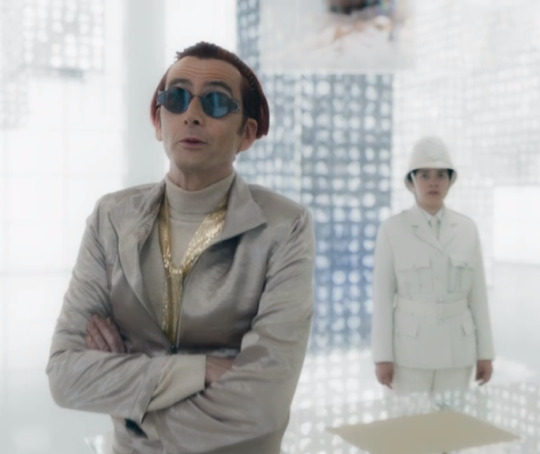
That is the 1967 planning a HEIST turtleneck for committing ESPIONAGE and STEALING THINGS in. Because turtlenecks are what modern human master spies wear to get their hands dirty - after all, he saw it in a movie once.
Crowley dons his tactical turtleneck sometime during the first major break in the action (which doesn't happen until after the joint miracle to hide Gabriel) after he learns about the threat the Book of Life poses to Aziraphale. Loverboy started mentally preparing himself to go after that book immediately upon learning that it was in play as a genuine threat.
Now let’s pick up at the S2E2 Dirty Donkey scene, reading the story from this angle. Of course, Crowley enables Aziraphale’s delusions about Heaven by hiding information from him, and does not disclose the Book of Life threat when they meet again. They go into the pub, Aziraphale shamelessly paws Crowley’s chest like the seductive Bond Girl he is, and Crowley gets to act all smooth and suave and intimidating as he chases off the interloping Mr. Brown (or Mr. Collins for the Pride & Prejudice fans, take your pick).
Ergo, theory: beginning in S2E2, Crowley is already thinking of himself as a Jane Austen/James Bond action hero (“How will our hero cope?”), psyching himself up to rescue Aziraphale by getting his spy game on and stealing the Book of Life.
Now, watch closely...This is where Aziraphale and Crowley brainstorm their plans to solve the problem they both know about: getting Maggie and Nina to fall in love and thereby get Heaven off their backs. Crowley’s vavoom plan is drawn from yet another movie (“Get humans wet and staring into each other’s eyes - vavoom, sorted. I saw it in a Richard Curtis film.”). But Crowley also implicitly shares his solution to the problem he hasn’t told Aziraphale about. And true to form, Crowley’s Jane Austen solution isn’t the same as Aziraphale’s Jane Austen solution.
Two solutions that fail by the end of Season 2, and a secret third one that might still work...and there's our magic trick of three.
‘“I’m lost. Am I doing a rainstorm?” Yes, babe. And a heist, too - just not until season three. Can I get a wahoo!?
I won’t spend time on A Companion to Owls during this meta, except to note that in all three minisodes, we get to watch stories that involve Crowley acting as a double agent on “his/their own side” - successfully making Hell and Heaven think he’s fulfilling their will while saving Job’s goats and children; failing to fool Hell when he does a good deed in Edinburgh; and of course, collaborating with Aziraphale whilst evading detection as an infernal turncoat during the Blitz.
(Because this is getting long, I'll also skip over Crowley's interrogation of Jim in this episode - I'll probably come back to that in another meta. But interrogating is a rather spy-ish thing to do.)
When we catch up with Crowley again later, he’s already slipped out of the bookshop, having left Aziraphale to his biblical reverie about Job. He saunters snakily down Whickber Street as usual, but with a very pointed and swift glance over his shoulder (see pic above). This demon is up to something - possibly something we didn’t get to see, something that may have happened offscreen while he stepped out. In any case, knowing there’ve been unfriendly angels in the neighborhood that morning, he’s rightly concerned about being spied on.
From this point until the beginning of episode six, there isn’t a whole lot of opportunity for Crowley to make any next moves. He babysits the bookshop, during which time he manages to wring some crucial information out of Jim; he follows his Crowley’s Angel around like a puppy, and downs a bottle of red like a good old fashioned lovesick boy once that’s been pointed out to him. If any plotting or scheming is underway, this occult being is keeping stumm for now.
This has been a long one, so I’ll wrap up with Crowley’s infiltration of Heaven with Muriel. The turtleneck disguise works (Archer fans, be vindicated!) long enough to gather some information that will be crucial not just to the denouement of S2, but also to Crowley’s journey in S3 (previous post on Crowley's Fall, Saraqael, and memory wiping). And Aziraphale gets to enjoy that view exactly zero times. The point isn’t oh, a turtleneck! How flirty! So cunty! So cute! Y’all. Everything matters. The costume change was a deliberate choice. In-universe, Crowley’s decision to wear his special spy turtleneck for spying in is a signal that he is out doing spy things, even as we watch.
In sum: Beginning in S2E2 and continuing through the end of the season, Aziraphale and Crowley are actively living out the scripts of two parallel, concurrent, and completely different Jane Austen stories. But you and I, dear fellow audience member, we came here for a comedy with a hefty jigger of romance, and that’s what Neil gave us to focus on. And right up until the Final 15, that was the only story we saw.
Meanwhile, Special Agent A. J. Crowley doesn’t have time to mope around at the end of S2E6. He’s kicked down, but he’s not out. He's got a Book of Life to steal, a very serious bone to pick with a certain memory-wiping angel, and his Angel and the world to save.
“‘Heigh ho,’ said [romantic, optimist, former demon, hero, master spy] Anthony Crowley, and just drove anyway.”
#so honestly#I think the biggest mark against this conclusion is that Crowley sees his mirror Maggie taking a nap at the end of S2E6#there is a strong chance of a depression nap before any further spying gets underway#but I am counting on Muriel to be a dorky ray of sunshine and snap him out of it with Clues#good omens#good omens meta#good omens 2#crowley in a turtleneck#demon bookseller plantdad spy
2K notes
·
View notes
Text
many thoughts about epic: the musical...
i am once again in the middle of essay writing but plautus is boring and my friend introduced me to this album so u already know I binged the entire thing
(quick warning for spoilers of homer's odyssey? if that's necessary?? man idk whatever)
first thoughts naturally concerned odysseus. i have hated this man with a burning passion ever since I started studying classics - i think he is irredeemably selfish, a liar masquerading as a 'resourceful hero,' and basically just a twat all around. that being said, i respect that epic is not an exact replica. in fact, i like that about it!
readings of odysseus as a loving husband and father, and a man who cares deeply for his crew and fellow warriors is one i would love to see reflected in the source text (though i admit i have only read two different translations so far, so this is subject to change depending on translators choice!), if only because it would be so so refreshing. and epic does that extremely well! i find epic's odysseus to be far more likeable, insofar as he is fueled not by greed for glory (kleos for the nerds out there) but rather the desire to return to his wife and son. (I personally would argue that, while homer's odysseus is indeed fueled by a desire for homecoming (nostos), it is not for the sake of penelope and telemachus, but rather concern over the security of his status and position within the household (oikos))
i also very much enjoy that the love he holds for his family is not an inherently positive trait. in the aeneid, and often in myth, it is achilles' son, neoptolemus/pyrrhus who kills the son of hector and andromache, astyanax by throwing him from the walls of troy - less common, it is odysseus (which i did not know until i googled it just now oops). homer's odysseus does not reject the gods. he is beloved by some, hated by others - he receives their boons and curses as they come. he revels in the attention of the divine, no matter positive or negative, for it is proof of his kleos. epic's odysseus is so much more... human. he doesn't vie for glory that reaches the skies. if anything, he rues it. in the horse and the infant he supplicates himself to (who i assume is) zeus - which is such a loaded act i am genuinely struggling to think of how to articulate it, but boy am I gonna try my darndest.
the act of supplication and guest-friendship (xenia) is a very key theme within the odyssey, and to a point in the iliad also - essentially, if a traveller were to arrive at your doorstep, you were obliged to let them in and provide food, drink, and lodgings to that traveller, no questions asked. in return (because reciprocity is VERY important in homer especially), the guest would provide entertainment, tales of their travels, etc, and would be respectful of their host. the patron of these travellers was zeus. any violation of these terms, on part of the guest or host, would be met with divine scorn. for odysseus to supplicate himself to zeus is therefore meta as hell, but I would instead bring attention to the echoing lyric "hes bringing you down to your knees." 'he,' assumedly, is astyanax. his father, hector, is dead; as is his grandfather, priam, and all of priam's other sons. at this point, one could assume that it is astyanax who is ruling troy, who is now the host of the city that odysseus, a traveller from another land, has entered and ransacked. zeus' 'prophecy' of astyanax growing old and seeking revenge (reciprocity! homeric greece had a 'revenge culture' - essentially 'an eye for an eye' as well as 'you scratch my back, I'll scratch yours,' though not always so clear-cut), therefore, would be odysseus' punishment for violating the terms of xenia.
supplication, however, is not limited to guest-friendship alone. for example, in odyssey 22, when odysseus slaughters the suitors occupying his home (is that spoilers?), their priest leodes supplicates himself at odysseus' feet, begging to be spared. odysseus takes his head from his neck in an instant. odysseus' kneeling before astyanax, therefore, is no simple act between a guest and his host - perhaps he is begging the infant for mercy, for forgiveness, or perhaps he is positioning himself for punishment; in killing astyanax, odysseus accepts his own death. perhaps this means his fate (which, in case of homeric epic, refers to the time and manner of one's death), or perhaps it is a part of him that has died. in just a man, odysseus asks "when does a man become a monster?" his killing astyanax prevents the boy from ever becoming a man, and spares him from a life fueled only by revenge and the need to regain his glorious birthright, and it turns him into a monster. just as he says he would, he trades in the world where he is 'just a man' for a world where he is a cruel beast, all for sake of his family.
(quick detour but i really like how odysseus' focus is primarily on penelope rather than telemachus. [insert deadbeat dad joke here], but in reality, he doesn't even know the boy. penelope he chose to marry and fall in love with - it's no question that he loves telemachus, but after ten years, it is only natural that he would miss his beautiful, tricky wife with more fervour than the child he never had the chance to love. it shows he is imperfect, even illogical - the son is the father's entire legacy. just as odysseus is 'son of laertes', so will telemachus be 'son of odysseus', the protector of his immortal heroic legacy. yet it is penelope whom odysseus yearns for.)
(another detour but "i'm just a man" is such a juicy lyric, because the entire message of homer's odyssey is that odysseus is not any man - he is a man that the muses deem worthy to inspire great poets to compose epic poems that persist through thousands of years and a million different voices - a hero. but epic's odysseus is not that hero. he is a man, trying to go home, craving comfort and the warmth of the hearth. these 'flaws' humanise him more than homer's odysseus could ever imagine.)
skipping over to polyphemus, odysseus violates xenia once again by killing polyphemus' sheep, albeit unwittingly. homer makes this violation very obvious - odysseus and crew eat polyphemus' cheese and wine while polyphemus tends to his sheep, knowing that the cave is obviously inhabited, and they even wait for polyphemus to return to ask for more. it is worth noting as well that, at this point, odysseus and crew are still jubilant about their victory, and unlike in epic, these 'detours' are purposeful, specifically so that odysseus can scope out the islands for anything of interest he can snatch and add to his spoils of war, adding to his kleos by means of physical wealth (timē) - which makes odysseus' offer of treasure to appease polyphemus all the more baffling in epic. this odysseus is a leader who prioritises the lives of his men over his own kleos, which makes the final lines - "you shall be the final man to die" // "what?" // "watch out!" - all the more heartbreaking. he wants to protect his men, so that they too may return to their families back on ithaca; the prospect of watching them die before his eyes after he already witnessed so many lose their lives in battle must be so utterly terrifying.
polyphemus is so excellently creepy as well! i loved him in the odyssey - this was where I really started to dislike odysseus, actually. he's a cyclops, obviously inhuman, yet he rears sheep and makes cheese and wine and weaves wicker baskets to keep them in, trying to play at humanity. i really did sympathise with him from the first time I read it. epic's polyphemus is similar, so very calm in his anger yet ruthless all the same, and demonstrates great restraint in comparison to his counterpart in the odyssey, who gets filthy drunk after mashing six men dead and allows odysseus+co. to fashion a stake with which to blind him. much of the violence against polyphemus, as well as the violation of xenia in homer's odyssey is 'excused' by the fact that polyphemus is a 'barbarian', to whom concepts of civilised people do not belong.
(very quick detour but polyphemus' first admonishment of odysseus - "you killed my sheep" up to "take from you like you took from me" - makes such heartbreaking parallels to astyanax's murder and the sack of troy. it almost provides a visualisation of the guilt that odysseus must still be battling. i would have loved to have been in his brain when he heard polyphemus say that.)
the mercy odysseus shows polyphemus is particularly interesting - homer's odysseus leaves him alive and tells him his name purely so that his name will spread and his kleos will grow. but epic's odysseus, despite his conviction to kill in survive and to avenge is fallen comrades in remember them, spares him. in part, this is to assure them an escape, so that the cyclops' giant body does not block their exit - but athena's interruption makes clear that this is not all. she criticises him, remarks "he is still a threat until he's dead." no doubt this calls back to zeus' warnings about astyanax, hence his refusal (or inability?) to commit to slaughter. for a homeric greek hero to allow a foe to live on after his allies had been slaughtered is a grave failure of reciprocity, casting shame on both the hero and their enemy. homer's odysseus escapes this with his reputation intact, since as a result polyphemus curses him to face poseidon's wrath - as I mentioned, for a hero, even negative attention from the gods is a good thing as it proves that their reputation/glory is known all over, even in olympus. but, as we have established, epic's odysseus cares not for kleos. the decision to tell polyphemus his name is entirely impulsive and irrational, grieving his comrades, hence athena's outrage.
the relationship between athena and odysseus is founded entirely on the principles they share, described in warrior of the mind (if anyone can lmk whereabouts this song fits in the timeline I will be so grateful, I'm stupid unfortunately :/). they value wisdom, reason, and rationality over brute strength and bloodlust. epic's athena becomes odysseus' patron goddess with the goal to "make a greater tomorrow" and "change the world" - aspirations that are entirely foreign to any homeric god. gods in homer do not care about the wellbeing of humans unless they are directly related to them, and they certainly don't care about the wellness of humanity as a whole. humans are toys and tools of the gods. the amount that athena cares for odysseus, even in the odyssey, is unusual, demonstrative of how much she cares for him, yet epic makes their comradery more obvious, even going as far as to (tentatively) call them friends. my goodbye frames athena's anger as disappointment at an experiment failed - calling back to warrior of the mind, where she claims to have "designed" him - but odysseus' replies to her makes clear that it is far more personal. perhaps, to her, odysseus acting so irrationally is even a betrayal; odysseus is abandoning the principles of reason they both once held and thus is forsaking all that they once shared and that she, as the goddess of wisdom, stands for.
ive always considered athena to be a very interesting goddess. she is a patron of both war, which in homer is only carried out by men, and weaving, the traditional work of women within the household - her very nature is a contradiction of masculine and feminine. although it is ares who is considered the 'black sheep' of the olympians for his brutality in war, epic's portrayal of athena through odysseus' lens paints her as lonely and ostracised - "since you claim you're so much wiser // why's your life spent all alone? // you're alone." It is clear that odysseus here does not view her as his patron at all, rather as a friend - and to that she takes offence, because she is a goddess, eternal and all-powerful. she does not need friendship or comradery; those are mortal concerns alone. personally, I see epic's athena as incredibly insecure. she cuts odysseus off because she cannot bare that a mortal has been able to read her so clearly, to see all the ugly parts of herself that she keeps hidden to retain the facade of the perfect goddess. she knows the paradox within herself - warrior and woman, immortal and alone - and rues that odysseus was able to see it as well. the cruellest part, the most ironic, is that his being able to figure out the true, imperfect nature of a god shows that he has not abandoned the path of the warrior of the mind. in fact, his wisdom extends beyond mortality into the realm of the divine. but athena is blinded by her anger and insecurity, and she says her goodbyes. she disappears from there, only to appear again to try to warn odysseus of his crew opening the bag of winds given to him by aeolus in keep your friends close, once again demonstrating her care for him, despite her anger.
the amount that odysseus cares for his crew is demonstrated time and again throughout the album, yet in the end, he still slowly loses their trust. aeolus' winds are the first sign. his crew betrays his orders upon the first whisper on the wind that he might be keeping treasure from them. the next sign, in puppeteer, is eurylochus' confession upon arrival to aeaea (circe's island), which odysseus brushes off, much as he brushed off eurylochus' concerns in luck runs out. then, in a matter of moments, 600 men are reduced to forty by the wrath of poseidon - which in itself is a significant change. while odysseus in epic is explicitly blamed for failing to kill polyphemus, homer's odysseus takes no responsibility for the deaths of hundreds of his men. it happens when they arrive at telepylos, which, unbeknownst to them, is home to the laestrygonians, a race of cannibalistic giants. odysseus, apparently sensing something off (who tf does he think he is, spiderman?), allows his entire fleet to enter the bay of telepylos while his ship alone remains outside - and when those ships are attacked and trapped, he alone takes his single ship and escapes, allowing twelve ships of men to be ripped apart and eaten by cannibals. an act which he shows no remorse for.
in my interpretation of homer's odyssey, it is this slowly slipping trust that eventually leads to his men ignoring his warnings and feasting on the cows of helios which leads to the deaths of all his remaining crew, including eurylochus and polites (spoilers? idk). so, once epic: the musical catches up to book 12 of the odyssey you WILL be seeing me again I hope ur excited.
there is definitely more i could say here, especially about the circe saga bcs ohhh my god I love circe and I love this circe especially (a female character with actual motive other than being a victim? homer could never) but unfortunately I'm running out of steam and I do in fact have 3 essays due this month (help) so I will probably return to this later !! hopefully its readable bcs I'm not going back to edit any of this ;)
#joined cort's spotify jam while writing this and got rickrolled#the message here is trust no one#skipped my seminar to do work and did this instead#fuck u plautus and your dumb menaechmi#this took like 4 hrs to write i have issues#epic the musical#epic the ocean saga#epic the circe saga#epic the cyclops saga#epic the troy saga#epic#classics#classical studies#homer's iliad#homer's odyssey#the odyssey#odysseus#penelope#media analysis#literary analysis#longpost#homer
93 notes
·
View notes
Note
for 'I can't believe it's canon', what about Jaskier/Dandelion's youthful looks? I know it's common fanon to make him at least part elf or fae or some other type of creature to explain the longevity, but i think in canon he's just like that? Babyfaced?
Hello dear! Ok, so,
Dandelion's looks and longevity/(and potential elven lineage) in the books, now with English and original Polish versions.
Alright, in order to answer this ask, I conferred with the wonderful and helpful @cherrypoison1889, who is Polish and has the books and is willing to indulge my obsessive absurdity.
(In my post about Geralt and Religion, I put out a request for any Polish fan of the books who wouldn't mind me bothering them with silly and ridiculous questions occasionally to get in touch. Cherry was kind enough to dm me.)
Basically, my meta has powered up. XD I now have a partner in crime. I am going to include our conversations about the words used in the original Polish and in the English translation to describe Dandelion.
We are just having very silly fun here, this isn't academic or anything pls my god, if you want academic or authoritative consult a doctor (phd in languages and whatnot). This is just fun, that's all.
Ok, so we know Dandelion looks young for his age.
In The Blood of Elves, which takes place AFTER the first two short story collections, Djikstra says that Dandelion looks like he is in his late twenties, even though he is in his late thirties. Here is what he says.
"...I know you're almost forty, look almost thirty, think you're just over twenty, and act as though you're barely ten."
So he looks a good ten years younger than he is and This is in Blood of Elves, which for TWN fans is around S2.
We also know he is a 'pretty boy'.
Dandelion is called pretty, by the narrative and other characters.
When Angoulême is being interrogated in The Tower of Swallows, and she is asked who Geralt is traveling with, she describes Dandelion like this....
"...a comely fellow called Dandelion, who's a troubadour, and carries a lute."
So she uses the term comely, which in English is typically usually used to describe women. I think that's the first time I've heard that word used to describe an adult man. Here's how Oxford dictionary defines it:
Comely: pleasant to look at; attractive (typically used of a woman).
So to me, this implies a pretty boy and yes the baby face.
I asked Cherry about what the Polish word is, and here is their answer:
Angouleme calls Jaskier "Przystojniak" in Polish, which is colloquial of Handsome Fellow (see also the word Przystojny, which means Handsome). This word is generally used only to describe men, but has been, in the past, also applied to women
So, there is some subtle gender-y stuff going on in that translation, but either way, he is considered good looking.
Then I asked Cherry about whether Dandelion is really often mistaken for an elf. There is a passage in the English translation that suggests that he is, but the wording in English is a bit ambiguous and slightly awkward.
In the process, Cherry and I found that there is a word in that section that changes pretty significantly in translation, suggesting again that he is very pretty.
Dandelion and longevity or elven lineage:
As far as his longevity, there is never at indication that he is part elf except that sometimes he is mistaken for an elf. The English translation implies that this is because of his style, but the original Polish implies it is his pretty face as well.
In Baptism of Fire, Geralt and Dandelion are in a forest, caught in a thunderstorm. They happen near a group of men who are waiting to meet elves and the men call to them:
"Over here, Master Elves!"
Geralt is not surprised by this mistake, as visibility is low, and they are both wrapped in grey elven mantels. Also, apparently, this is a regular occurrence for Dandelion. The book says:
"As far as the foppish Dandelion was concerned, he was regularly mistaken for an elf or a half-elf, particularly since he had begun wearing his hair shoulder-length and taken up the habit of occasionally curling it with tongs."
Ok, so, the English translation uses the phrase 'as far as...Dandelion was concerned', which could mean two different things. It could mean "regarding Dandelion," or "according to Dandelion." So I asked Cherry what it says in Polish.
fangirleaconmigo
So that phrase in english could basically say that dandelion WAS regularly mistaken for an elf
OR OR OR
it could mean that he CLAIMS he is regularly mistaken for an elf
cherrypoison1889
So, in Polish it is that Dandelion is often mistaken for an elf or half-elf.
fangirleaconmigo
ok, so it isn't that he claims it, but that he IS mistaken for an elf.
ok perfect. thank you.
cherrypoison1889
As in, it's other's opinion that he looks like an elf
Then, Cherry asked me about the word foppish, and we realized that the original word in Polish has quite different connotations!
Foppish, in English, generally refers to a man who is "concerned with one's clothes and appearance in an affected and excessive way." (Oxford dictionary)
So, an English speaker sees this word as a commentary on Dandelion's vanity and clothing. But actually the Polish word is different. Here is what Cherry said:
cherrypoison1889
In Polish it's "Gładysz", which means someone with a smooth, unblemished visage (see also the word Gładki, which means smooth)
fangirleaconmigo
the word they translated to foppish?
cherrypoison1889
Yep, that's the word. So, 1 count for Dandy being called a pretty pretty boy <3
fangirleaconmigo
haha that's awesome thank you
cherrypoison1889
So in english, you could say he's described slightly more pejoratively?
fangirleaconmigo
foppish it's less about his attractiveness and more about his own vanity or obsession with appearance.
just stylish and vain basically
you could see that negatively, as interest in appearance is often looked down upon in men, (eta: unfairly of course, in macho cultures, not by me obviously) but not everyone does see it as negative. but yes, it has more potential for negative implications
cherrypoison1889
Just looked it up in a dictionary, apparently Gładysz also means someone who is nice, i.e. kind
So in Polish it's just he's a sweet pretty boy uwu
fangirleaconmigo
ah interesting! so the original word has better implications all around
that's so cute
cherrypoison1889
Baby boy baby
So, there is no conclusive evidence for Dandelion being part elven, other than just the fact that he is mistaken for one. He is a pretty pretty boy who looks young for his age.
But since he looks like an elf, there's a bit of fertile ground to headcanon it. It's not canon but it's a reasonable use or extrapolation of canon! Would he even know if he were like a quarter elf? Who knows? We don't even know where Lettenhove is. Go crazy!
So, TWN accidentally not aging him turned out to be not too 'off canon'. And it is no surprise that he is often head-canoned as part elf.
Actually I think Hexer actually makes him part elf as well. Hell, I make him part elf in most of my fics.
So there's no canon evidence? But it's not an outrageous thing to headcanon or anything.
THANK YOU CHERRY FOR DOING THIS WITH ME. IT'S SO FUN BEING A NERD WITH YOU ABOUT TRANSLATIONS.
458 notes
·
View notes
Text
Oh but it’s doubly tragic how Manny’s gradually worsening health and eventual death hurt Luz in OTHER ways too, ways that no doubt agonized Manny. The show has made it clear by now that there were or WOULD be people in Gravesfield that Luz could find and get along with, fellow weirdoes like Masha and Vee’s friends, Mike and Bridget (that’s what I call those two kids who suggested the Haunted Hayride, given who they were based off of), that thing.
But they’re constantly moving around. Luz and Camila never get the chance to settle down in a place and truly engage with a community. They’re always going from place to place, and so they’re just USED to being strangers and never having a definitive area to call home, at least not anymore.
Obviously the Boiling Isles is rather unprecedented to Luz, but also how familiar did it feel to her, to casually move to another place and stay there? How much did it hurt when her mom sent her away; Because it was the first time Luz had to leave, and her parents weren’t there with her? The Nocedas moved to keep themselves together, now Camila is seemingly sending Luz off to be away with her.
Luz has always been a wanderer, trying to find a place to fit in, or being forced to travel before she CAN adjust. I wonder if Caleb and Philip had ever been like that before Gravesfield, and that’s part of why Philip latched onto that place’s traditions so much, it seemed to work out, or it HAD to when Philip lost Caleb and couldn’t move with him like before, and he HAD to stay this time.
When Camila begged Luz to stay with her in Yesterday’s Lie, and leave the demon realm; When Luz chose to do so, how many times did she have to give up a new home with friends, potential or otherwise, for the sake of a parent? How familiar was her resignation, as it had been for Manny? Resigned for the futility of wanting to stay but leaving anyway for a parent, for a place that either wasn’t much better, or worse? Just like the futility of doing so much to save Manny, wanting him alive, just for him to die regardless?
Not to mention the meta implications of Camila and Manny being immigrants, or at least coming from a generation of immigrants who traveled to the U.S. How they’re just used to it. How Luz was excited so much over the idea that she finally found a place she could stay in, but then she just accepts going back to the human realm and leaving the Boiling Isles, because she’s used to that? Sure, THIS time she made friends, but in the end, she’s used to losing people. She lost her dad, after all.
How much did Eda’s curse remind Luz of Manny’s deteriorating condition? Did Manny ever try to hide his illness, did that accidentally influence Luz’s tendency to bottle up and not talk about her issues??? Eda must’ve reminded Luz of Manny so much; Willing to defy conventions by supporting their loved one’s love of the unorthodox. Manny’s last gift led Luz to Eda, like Eda and the Demon Realm was his last gift to his daughter in a sense; He made her feel like she belonged, so it was the least he could pass on.
And Eda’s curse wearing away at her health must’ve reminded Luz so much of her dad. Remember when she gives Eda health tips on how to not wear herself out, lift with her knees, drink water? It’s not just because her mom’s a vet. It must’ve been because she had to apply that same advice to her dad. Luz is USED to taking care of a parent. And she’s so desperately trying to prevent it from happening again, she just FINALLY felt like herself again with Eda, with a parent who supported her.
And then she breaks down at the end of Agony of a Witch. Because Luz lost yet another parent like that to their gradual condition. And then she has to move again, leave a home she settled in, can’t get attached; It’s like a never-ending cycle for Luz. The monotony and despair must’ve been maddening.
Plus, it plays into Luz’s desperation and need to feel responsible for helping Eda, her guilt; Because she SO BADLY doesn’t want to lose this again. Did she blame herself, did Camila too, because they didn’t ‘do enough’ to help Manny, after sacrificing so much? Failing Eda is like failing Manny again. God, this trauma must’ve done so much to Luz when she enthusiastically chose to help Gwen with Eda’s curse, and then found out she was being scammed.
Luz is USED to this. She’s used to having to keep quiet over her dad’s death, to constantly losing a sense of community. To doing everything for someone, only to fail regardless. To lose someone to that illness. It’s a repeating tragedy, especially on Camila’s side; Just like Luz, she grew up neurodivergent with fictional hyperfixations, she got bullied and ostracized. Camila had to conform to survive, and she sees the same thing again happening in Luz.
There’s so much talk of this show’s frequent parallels, but. God. There really is this idea of things changing but also staying the same, and how horrific and trapping that can be. And it can be good and inspirational, it’s kind of a generational issue, and about what you pass down for others to carry over. People are so different yet still the same. People want to fit in but also be themselves. This show.
The Owl House really is just about finding a sense of belonging. A place where you can feel comfortable in your own skin. Grief over losing loved ones and going through the same things again, being a force of change instead of tradition. Holding onto people but without keeping them trapped. Luz held onto Manny’s memory by enjoying what he gave her, embracing what he loved about Luz.
So to lose Eda, who she found through Manny’s encouragement of her weirdness; To lose her passion for her hyperfixations. It’s like losing her father all over again, or even for real this time, a final death beyond just physical, but also in terms of emotion and legacy. It’s losing the neurodivergent joy he brought her, the happiness he represented to Luz that she associated him with. I just can’t.
628 notes
·
View notes
Text
S1 Flash AU where Barry doesn't reset time and Cisco manages - barely - to escape Eowells before getting murdered. Because his breach powers activate due to his 'holy shit my favorite boss is about to murder me' panic and he falls through the floor (gravity yeeting him out of danger fast enough only because Eobard was not expecting it and thus failed to react, left standing there holding his vibrating hand out and looking ridiculous)
And his powers dump him halfway across the city. Cisco didn't go to Caitlin because last he knew she's in the middle of Jitters. Not Barry since Cisco had no idea where he was and also his powers were seeking 'safety' which was not where Barry was at with the whole city-destroying-storm problem going.
He lands in front of the one person he knows, without a doubt, will not turn him over to Harrison Wells even if he won't actually do anything to help Cisco otherwise. Hartley Rathaway, who did at least attempt to help find Ronnie even if it was also a ploy to escape.
From Hartley's PoV this shiny portal appears, dumps a Cisco Ramon at his feet, and blinks immediately out of existence, leaving Cisco passed out on the floor.
Hartley - When I was hoping to have hot guys fall at my feet, I did not mean Cisco Ramon.
Cisco - *too unconscious to realize Hartley called him hot*
When Cisco wakes up, it takes him a bit to realize that he's relatively safe and he winds up spilling the whole 'Harrison Wells is a time traveler called Eobard Thawne and he tried to fucking murder me' thing with Hartley. Because Hartley's letting Cisco ramble in hopes of getting an explanation for the whole appearing from nowhere to fall at his feet thing. Which he isn't really getting, but at least Cisco doesn't pass out again when Hartley suggests that maybe Cisco is also a meta.
Cisco - What are we gonna do about Evil Wells???
Hartley - What we?
The city is not destroyed by the tsunami - the Flash was able to counter that - but the storm still damages a significant portion of the city. The Flash is missing, Joe is in the hospital, Mark Mardon died in his own storm as some kind of ironic retribution by nature, and Cisco can't get ahold of Caitlin (she's fine). Hartley manages to get in touch with Jerry, but learns his dad's dead and his mom actually wants to know he's alright.
With the city in a disarray and the Flash not showing up, it does wind up being Cisco and Hartley - and other metas crawling out of the woodwork - who start saving lives from damaged buildings.
Suddenly the Flash isn't the only 'good meta' media darling. And even some of the more criminal types are getting lauded as heroes. It's great PR for metas and it makes Cisco that Team Flash isn't doing enough to actually help they're fellow metas. They've been so busy trying to stop bad guys that they're not actually helping their community.
Of course, how does he tell that to Barry when someone they all trusted (except Joe) has turned out to be Barry's mom's killer? Barry's gonna be focused on that, understandably. If they can find Barry.
And, of course, Cisco refuses to believe that Barry might be dead. (and he's right, but Barry's got other problems at the moment and, unfortunately, it might take a while before everyone finally finds out he's okay)
42 notes
·
View notes
Note
I know that industry creations are not revolutionary and I agree with some people who talk about the the gay white capitalism aspect of this in concrete (especially knowing that some producers and actors are Zionists). But I like how intended or not the series take into account the class axis. In my opinion, Hawk also gets married to maintain his social status, be middle-upper class. It is the way the series insinuates that marriage and the heteronorm are the way to assimilate the queer or dissident and that anyone who does not accept it is doomed to loneliness, to poverty, exclusion and disease. But it simultaneously shows that that’s not the case, that it’s a deception of society to keep people from rebelling and can serve as a critique of today’s queer struggles that have marriage as the ultimate goal. It's something I've been thinking about since the beginning because of how they present the markers of class in Tim and in Hawk (the clothes, their houses, their friends, their leisure, their health). Also like, at the beginning, Tim presents the capitalist vision of "love is love" in that conversation on the beach. But it is Hawk who depoliticizes his identity (he is just a man who fucks other men) and it is Tim who understands the importance of community and the leftist struggle to confront his country's values (imperialism, the monogamous nuclear family that Lucy and Hawk represent and that is a big lie, the fascism).
The series has a lot of details and it is unfair to present it just as sex with plot.
Sorry I know that is long and sounds confusing and pedantic.
oh wow i love this. i agree with everything you said really.
i noticed the commentary on class which is very subtle imo but it’s there definitely - esp during the early eps when we were still being introduced to these characters. like the look of wonder on tim’s face when he first sees hawk’s flat, to hawk having a fancy ass lunch with his mum then going to his family home, the differences in their lifestyle etc
its all there - and i think it futher highlights the imbalance in their relationship. in addition to the usual experience and age difference, there was always a class imbalance too that adds to the complexity of their relationship and power dynamics.
you know that is why i really like that they have two parallel storylines running together bc we can see how tim’s views have changed so drastically and the only thing left to explore is why and how. the bit about him denouncing the right and embracing an ideology that 50s tim was so vehemently against is something so interesting, i am so interested to see more of that
yeah exactly - the show is so much more than sex and i really hope people can see that
thanks for this ask though - i loved reading it🫶
12 notes
·
View notes
Photo
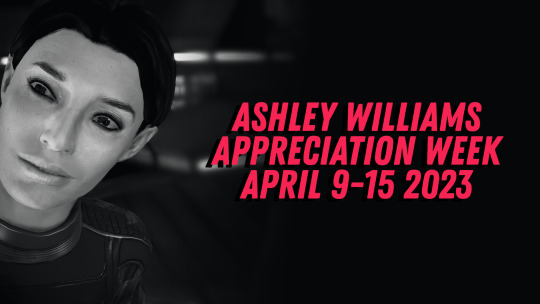
Ashley Williams Appreciation Week 2023
From April 9-15, this blog is hosting Ashley Williams Appreciation Week 2023 in honor of our girl's -135th birthday!
Create posts for Ashley Madeline Williams - photomode fun times, gifsets, edits, visualosities, aesthetics, picspams; fanart; fanfiction, meta, headcanons; fanmixes/playlists; fancasts; rec lists; videos, anything you like - with the tag #AshleyWeek2023!
And I mean anything. If you have a delicious recipe that you think Ashley would enjoy or make, I wanna hear about it. If you are pressed for time and/or low on inspiration and all you can manage to scrape up is a two word text post saying "Ashley cool", I want you here.
Rules
Be positive: No character bashing nor pitting Ashley against Kaidan nor other characters
Be cool: No bigotry of any kind against real people (warn for fictional bigotry) nor whitewashing
Be polite: Respect your fellow creators and different ships, put NSFW or long content under a cut, tag common triggers
Optional themes
9th - "It's not in my files or something?" | Background: Ashley's cultural, religious, or just pre-comics/games background
10th - "... magic-sparkly-hearts-and-stars feelings." | Emotion: Angst, fluff, love, hate, whatever gets the big feelings going
11th - "Right behind you, Commander." | Shepard: Ashley's relationship with Shepard, be it platonic, romantic, adversarial, whatever (in honor of Shepard's birthday on this date)
12th - "I cannot rest from travel: I will drink life to the lees..." | Poetry: Ashley's love of poetry
13th - "It's in my blood." | Tropes: Call-backs, only one bed, MacGuffins, all your faves
14th - Date of Birth: April 14, 2158 | Birthday: How would Ashley celebrate her birthday?
15th - Free Day!
Optional prompts
Your favorite thing about Ashley
Favorite scenes
Favorite quotes
Favorite personality traits
Scene/moment that you fell in love
AUs
Crossovers
Alternate submission, since Tumblr tags can be wonky
@tag @cannot-rest, or
Submit a link to your post
Spread the word, feel free to ask questions, and have fun!
#ashley williams#mass effect#mass effect legendary edition#mele#mass effect trilogy#bioware#dailyvideogames#gamingdaily#dailygaming#dailygames#videogamewomen#gamingladies#gamingnetwork#AshleyWeek2023
153 notes
·
View notes
Text
I cannot stop thinking about 1968 Tim, given the new context of 1957 Tim.
This Tim -- who can barely let himself look at Hawk--

wracked with guilt and shame and longing--

and YES, it's partly about the (not vow but) practice of celibacy he's trying to keep, but more than that, it's this--

not wanting to let himself fall back into the trap of believing.
because, last time, it tore him apart.
379 notes
·
View notes
Text
One thing I find interesting about the 80s scenes is how everyone appears to have changed enormously, except for Hawk. I really love the 80s scenes in general, as they make me super interested in seeing how all those characters get to that point. The relationship between Hawk and Tim is so different to what we have seen in the 50s – much more balanced. But it is mostly Tim that has changed and grown.
Now, I’m not saying that Hawk is still the same person he was in the 50s. He’s clearly older, appears to be overall more mature and calmer, and even vulnerable to some extent. Yet his flaws remain. He’s clearly terrified of being outed, struggles to show emotions and prefers to run away and disappear. He’s still stoic and self-centered.
Marcus used to be very similar to Hawk, but has clearly changed. Mostly, because he has allowed himself to love and be loved. Tim is not the naïve, gullible man we’ve met in the first episode, but he’s still very passionate about the people and causes he cares about.
This reminds me of what Mary said in episode 2 – that hiding a part of yourself is different from killing it. And I believe that the reason Hawk has been unable to change and grow is because he's been trying to kill that part, again and again.
I don’t want to turn this into an analysis now, as we still have some episodes to go, and analyzing the 80s scenes is almost impossible without knowing what has actually happened. And I don’t want to rely too much on the synopsis for future episodes and other stuff without seeing it play out. But it is clear that Marcus and Frankie have decided to love each other, building a loving, lasting relationship. Tim has chosen to be authentically himself, just as he’s been craving to live like in the 50s. I feel like he might be outed against his will at some point. But even if that turns out to be true, he has still decided to openly be himself, fighting for what he believes in.
Hawk has chosen to kill a part of himself – not necessarily his sexuality, as he still has relationships with men, but any form of a deeper connection. And I feel like you can tell that he is regretting it, by the way he's observing all those openly queer people.
Maggie has accused him of trying to clear his conscience, and I don’t believe that she’s wrong. But I also don’t think that Hawk came by just to say that he’s tried. I think he decided to visit Tim, because a) he wanted to see him for himself, probably hoping that he wasn’t actually doing that bad, and b) to hopefully receive the opportunity to make things right. Realizing that Tim is in fact dying and that there would not be a lot of time left to make amends, he decided to stay. But I also feel that he wants to spend time with Tim. Ironically, I think Hawk is now in the position that Tim used to be in – yearning for something he can’t have. When he sees Marcus and Frankie together, he sees a life he has never dared to live. And now, there is no time to live it anymore, even if he dared to. And as Tim does not have much time left, Hawk chooses to spend it with him.
But in the end, Hawk is still the same man he’s always been. Tim and Marcus have changed immensely, mostly because they decided to not kill a part of themselves. Hawk has decided to try and kill it, and has therefore never been able to grow properly, at least in regards to Tim. And it makes it impossible for him to do the right thing now, as he repeatedly returns to his old ways.
#fellow travelers#kinda meta post#mostly a theory i guess as we don't have all the information yet so maybe the connection to mary's words is completely wrong lmao#hawkins fuller#tv#meta
124 notes
·
View notes